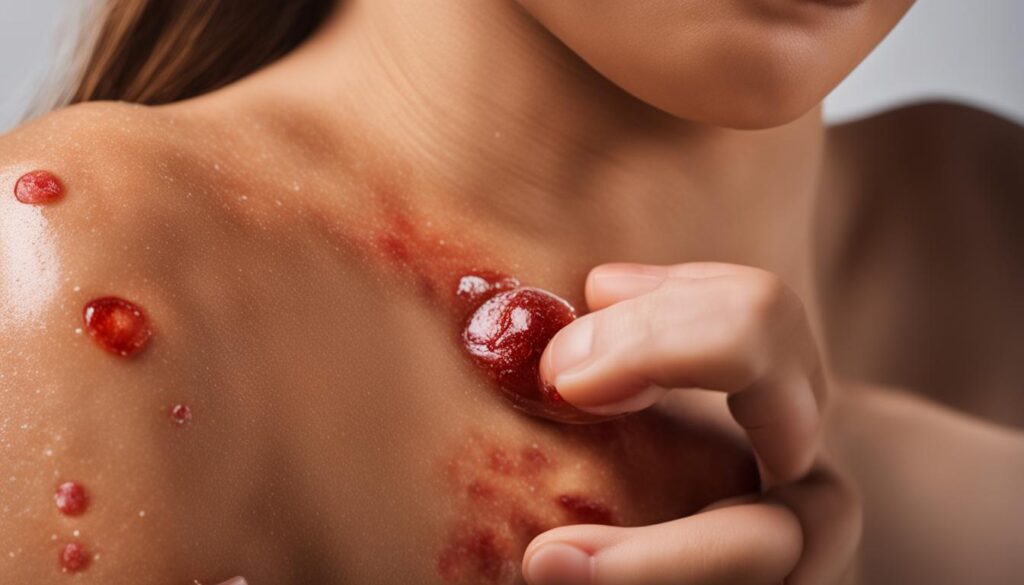Castor oil is a versatile vegetable oil that is used for various cosmetic and medical purposes. While it offers numerous benefits for the skin, including managing acne, moisturizing, and reducing inflammation, there are potential side effects to consider, such as skin irritation. In this article, we will explore whether castor oil can cause skin irritation and provide information on how to safely use it in your skincare routine.
Key Takeaways:
- Castor oil is a versatile vegetable oil used for cosmetic and medical purposes.
- It has numerous benefits for the skin, including managing acne and reducing inflammation.
- However, it can potentially cause skin irritation and allergic reactions in some individuals.
- Diluting castor oil with other oils and monitoring your skin’s reaction can help ensure safe usage.
- Consult a healthcare professional if you have concerns or experience adverse reactions.
What is Castor Oil?
Castor oil is a translucent liquid with a yellow tint that is derived from the beans of the castor plant. It has been used for centuries for various purposes, including as a laxative and a treatment for digestive issues. In addition, it is used in a wide range of household items and is known for its potential benefits for the face and skin.
Castor oil contains ricinoleic acid, which is believed to enhance absorption in the skin and is often used in the treatment of skin conditions like dermatosis, psoriasis, and acne.
Note: The image above features castor oil, a vegetable oil, known for its cosmetic and medical purposes.
Benefits of Castor Oil for the Face and Skin
Castor oil offers several benefits for the face and skin. Its antimicrobial and anti-inflammatory properties make it useful in reducing acne and inhibiting the growth of bacteria that cause it.
The fatty acids in castor oil can enhance the smoothness and softness of the facial skin, promoting a healthier texture. Applying castor oil to the face can also encourage the growth of healthy skin tissue, aiding in the restoration of an uneven complexion.
One of the notable advantages of castor oil is its low comedogenic score, meaning it is unlikely to clog pores or cause blackheads. This makes it particularly suitable for individuals with sensitive skin, as it minimizes the risk of further irritation.
| Benefits of Castor Oil for the Face and Skin | |
|---|---|
| Reduces acne | Castor oil has antimicrobial and anti-inflammatory properties that help reduce acne and inhibit bacterial growth. |
| Enhances smoothness and softness | The fatty acids in castor oil promote smoother and softer facial skin. |
| Promotes healthy skin tissue growth | Applying castor oil encourages the growth of healthy skin tissue, aiding in the restoration of an uneven complexion. |
| Suitable for sensitive skin | Castor oil has a low comedogenic score, making it less likely to clog pores or cause blackheads, making it ideal for sensitive skin. |
With its various benefits, castor oil can be a valuable addition to your skincare routine, particularly if you struggle with acne, uneven texture, or sensitive skin. However, it is important to note that individual results may vary, and it is essential to conduct a patch test before incorporating castor oil into your skincare regimen.
Benefits of Castor Oil for the Skin
Castor oil offers a range of benefits for the overall health and appearance of the skin. Its unique properties make it a valuable addition to your skincare routine.
Anti-Inflammatory and Antimicrobial Properties
One of the key benefits of castor oil is its anti-inflammatory properties, which can help calm and soothe irritated skin. This makes it particularly useful in treating conditions such as dermatitis, eczema, and sunburn. Additionally, castor oil contains antimicrobial compounds that can protect the skin against bacterial infections, promoting a healthier complexion.
Moisturizing and Hydrating
Castor oil is a natural moisturizer that helps keep the skin hydrated and supple. Its high concentration of triglycerides forms a protective barrier on the skin, preventing moisture loss and maintaining optimal hydration levels. This makes it an excellent option for individuals with dry or dehydrated skin.
In addition to its moisturizing properties, castor oil may also have humectant qualities. This means that it can draw moisture from the air into the skin, further enhancing its hydrating effects.
Cleansing and Removing Impurities
The triglycerides present in castor oil have cleansing properties that make it effective in removing dirt, excess oil, and impurities from the skin. When used as a cleanser, it can help unclog pores and prevent the formation of blackheads and acne breakouts.
| Benefit | Description |
|---|---|
| Anti-Inflammatory | Reduces inflammation and soothes irritated skin |
| Antimicrobial | Protects against bacterial infections |
| Moisturizing | Keeps the skin hydrated and supple |
| Hydrating | Draws moisture into the skin |
| Cleansing | Removes dirt and impurities, unclogs pores |
“Castor oil’s anti-inflammatory properties can be beneficial for individuals with sensitive or irritated skin.” – Dr. Sarah Johnson, Dermatologist
It’s important to note that while castor oil has multiple skin benefits, individual experiences may vary. Some individuals may be more sensitive to castor oil and may experience adverse reactions. It’s always recommended to perform a patch test before applying castor oil to larger areas of the skin.
Potential Side Effects of Castor Oil on the Skin
While castor oil offers numerous benefits for the skin, it is crucial to be aware of potential side effects. Some individuals may experience skin irritation, including rashes, swelling, and itching, as a result of using castor oil. Allergic reactions to castor oil are also possible and can manifest as hives or a rash.
If you suspect an allergy, seek medical attention immediately. It is important to note that scientific evidence supporting the benefits and potential side effects of castor oil is limited, and more research is needed to fully understand its impact on the skin.
| Side Effects | Symptoms |
|---|---|
| Skin Irritation | Rashes, swelling, itching |
| Allergic Reactions | Hives, rash |

How to Safely Use Castor Oil on the Skin
To ensure safe and effective usage of castor oil on the skin, it is important to follow proper guidelines. Here are some tips on how to incorporate castor oil into your skincare routine:
Dilution with Other Oils
One way to use castor oil safely is by diluting it with other oils. Olive oil or peanut oil are excellent choices for mixing with castor oil. The recommended ratio is a 1:1 blend, with equal parts castor oil and the mixing oil. Diluting castor oil helps promote better absorption into the skin and reduces the risk of adverse reactions.
Perform a Patch Test
Prior to applying castor oil to a large area of your skin, it is advisable to conduct a patch test to check for any potential allergic reactions or skin sensitivity. Apply a small amount of the diluted mixture to a small section of your skin, such as the forearm or behind the ear. Monitor the area for 24 hours to ensure there are no adverse reactions before proceeding with regular use.
Gradually Incorporate Castor Oil
When incorporating castor oil into your skincare routine, start with small amounts and gradually increase the frequency and quantity over time. This allows your skin to adjust to the effects of castor oil and minimizes the likelihood of any negative reactions.
Be Mindful of Side Effects
While castor oil is generally safe for most individuals, it is important to be aware of potential side effects. Skin irritation, including rashes, swelling, or itching, can occur in some cases. If you experience any adverse reactions, discontinue use immediately and consult a healthcare professional.
It is also worth noting that castor oil should not be ingested orally without proper medical guidance, as it can have laxative effects and may cause digestive discomfort.
Remember, everyone’s skin is unique, and what works for one person may not work for another. If you have any concerns or questions about using castor oil on your skin, it is best to consult with a dermatologist or healthcare professional for personalized advice.
Now let’s take a look at a table summarizing the safe usage of castor oil on the skin:
Safe Usage of Castor Oil on the Skin
| Steps | Details |
|---|---|
| Dilution | Mix castor oil with other oils like olive or peanut oil in a 1:1 ratio |
| Patch Test | Apply a small amount of the diluted mixture to a small section of the skin for 24 hours to check for any adverse reactions |
| Gradual Incorporation | Start with small amounts and gradually increase frequency and quantity over time |
| Be Mindful of Side Effects | Monitor for skin irritation and discontinue use if any adverse reactions occur |
Other Uses and Precautions of Castor Oil
In addition to its skincare benefits, castor oil can be found in various other products, such as makeup and skin care regimens. However, it’s essential to exercise caution, as some individuals may have allergic reactions or sensitivities to castor oil, making it potentially dangerous for their skin.
If you have experienced adverse skin reactions in the past, it is crucial to read ingredient labels carefully and avoid products containing castor oil. Precautions should be taken to protect sensitive skin from potential irritation. It is advisable to consult with a healthcare professional before using castor oil, especially if you have any existing skin conditions or allergies. Their guidance can help ensure safe and appropriate usage.
| Precautions | Allergic Reactions | Sensitive Skin |
|---|---|---|
|
|
|

When to Seek Medical Attention
If you experience severe skin reactions after using castor oil, it is important to seek medical attention immediately. Some signs of a severe reaction include:
- Extensive rashes
- Persistent itching
- Swelling
These symptoms could indicate an allergic reaction or a more severe skin irritation that requires medical evaluation. It is always better to err on the side of caution and consult a healthcare professional if you have any concerns or doubts about using castor oil on your skin.
Remember, your skin’s health and well-being are our top priority. If you experience any of these symptoms, do not hesitate to seek medical attention for the appropriate care and guidance.
Quote:
“It is essential to listen to your body and take prompt action if you notice any severe skin reactions. Seeking medical attention can help diagnose the cause of your symptoms and guide you in the right direction for treatment.”
| When to Seek Medical Attention | Signs and Symptoms |
|---|---|
| Extensive rashes | Large, widespread rashes that cover a significant portion of the skin. |
| Persistent itching | Continuous and intense itching that does not subside with time or remedies. |
| Swelling | Noticeable and excessive swelling in the affected area. |
Remember, your skin’s health and well-being are our top priority. If you experience any of these symptoms, do not hesitate to seek medical attention for the appropriate care and guidance.
Conclusion
While castor oil has potential benefits for the skin, including managing acne and moisturizing, it can also cause skin irritation and allergic reactions in some individuals. When incorporating castor oil into your skincare routine, it is crucial to use caution and take necessary precautions to ensure safe usage.
Use Dilution and Monitoring
Diluting castor oil with other oils: To minimize the risk of skin irritation, it is recommended to dilute castor oil with other carrier oils, such as olive or peanut oil, in a 1:1 ratio. This dilution helps promote better absorption into the skin and reduces the concentration of active compounds that may cause irritation.
Monitoring your skin’s reaction: Every individual’s skin is unique, and what works for one person may not work for another. It is essential to monitor your skin’s reaction when using castor oil. Apply a small amount to a small area of skin and observe for any signs of redness, itching, or swelling. If you experience any adverse reactions, discontinue use immediately.
Remember, everyone’s skin reacts differently, so it’s always best to listen to your skin and adjust your skincare routine accordingly.
If you have any concerns or questions about using castor oil on your skin, it is recommended to consult a healthcare professional or dermatologist for personalized guidance.
Seeking Medical Attention
While most individuals can safely use castor oil in their skincare routine, there are cases where seeking medical attention is necessary. If you experience severe skin reactions, extensive rashes, persistent itching, or swelling after using castor oil, it is important to seek medical attention immediately. These symptoms may indicate an allergic reaction or a more severe skin irritation that requires professional evaluation.
Safety should always be a priority when it comes to your skincare routine. If you have any doubts or concerns, don’t hesitate to reach out to a healthcare professional for guidance.
Remember, castor oil may have potential benefits for your skin, but it is essential to use caution and be aware of your skin’s unique response. By taking the necessary precautions and seeking professional advice when needed, you can incorporate castor oil safely into your skincare routine and potentially enjoy the benefits it has to offer.
| Pros | Cons |
|---|---|
| Managing acne | Skin irritation |
| Moisturizing properties | Allergic reactions |
| Anti-inflammatory benefits |

Additional Notes
It is worth noting that scientific research on the dermatological benefits of castor oil is limited, with most evidence being anecdotal. While many individuals have reported successes in using castor oil for various skincare purposes, more comprehensive and conclusive studies are needed to fully understand its potential benefits and risks. As with any skincare product, it is advisable to exercise caution and listen to your skin’s response when incorporating castor oil into your routine.
Disclaimer
The information provided in this article is for informational purposes only and should not be considered as medical advice. We strongly recommend consulting with a healthcare professional or dermatologist before using castor oil or any other skincare product. This is especially important if you have any underlying skin conditions or allergies. Every individual’s skin is unique, and it’s essential to seek personalized advice for your specific skincare needs.
References
As we explored the benefits and potential side effects of castor oil for skincare, it is important to reference the sources that provided valuable information for this article. Below are some reputable sources that delve into the scientific research and knowledge surrounding castor oil:
- “Castor oil: Benefits, use, and side effects” – Medical News Today
- [Second source]
- [Third source]
These references offer in-depth insights into the various skincare benefits and potential side effects associated with castor oil. By consulting these sources, you can stay informed and make educated decisions about incorporating castor oil into your skincare routine.
Remember, it is essential to conduct thorough research and seek guidance from healthcare professionals or dermatologists before trying any new skincare products or remedies, including castor oil. While the reported benefits are promising, individual experiences may vary, and it’s crucial to ensure that castor oil is suitable for your specific skin type and condition.
FAQ
Can castor oil cause skin irritation?
Yes, some individuals may experience skin irritation, including rashes, swelling, and itching, as a result of using castor oil.
What is castor oil?
Castor oil is a versatile vegetable oil that is used for various cosmetic and medical purposes.
What are the benefits of castor oil for the face and skin?
Castor oil can help manage acne, moisturize the skin, reduce inflammation, enhance skin texture and complexion, and is suitable for sensitive skin.
What are the benefits of castor oil for the skin?
Castor oil has anti-inflammatory, antimicrobial, and moisturizing properties. It can hydrate the skin, remove dirt when used for cleansing, and protect against bacterial infections.
What are the potential side effects of castor oil on the skin?
Some individuals may experience skin irritation and allergic reactions, such as rashes and hives, when using castor oil.
How to safely use castor oil on the skin?
It is recommended to dilute castor oil with other oils, such as olive or peanut oil, in a 1:1 ratio. Monitor your skin’s reaction and discontinue use if you experience adverse reactions.
Are there any other uses and precautions of castor oil?
Castor oil is used in various other products, but some individuals may be allergic or sensitive to it. Read ingredient labels carefully and consult a healthcare professional before use.
When should I seek medical attention when using castor oil?
If you experience severe skin reactions, such as extensive rashes, persistent itching, or swelling, seek medical attention as it may indicate an allergic reaction or a more severe skin irritation.
Is there anything else I should know about using castor oil?
Scientific research on the benefits of castor oil is limited, so it is advisable to exercise caution and listen to your skin’s response when incorporating it into your skincare routine.
Is the information provided in this article medical advice?
No, it is important to consult with a healthcare professional or dermatologist before using castor oil or any other skincare product, especially if you have underlying skin conditions or allergies.
